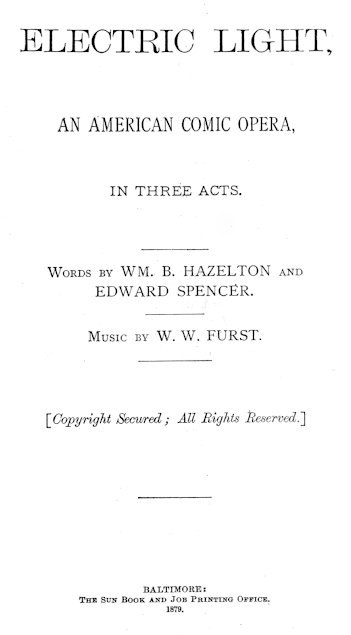Electric Light Opera
Today, an electric-light opera. The University of Houston's College of Engineering presents this series about the machines that make our civilization run, and the people whose ingenuity created them.
From a remote corner of the Eastman School of Music Library comes the strangest item. It's title is ELECTRIC LIGHT: An American Comic Opera, in three Acts. What's so odd is that it carries the date 1879. Not till October 21st of that year would Edison finally manage to make a successful incandescent lamp. Not till the year following did he demonstrate electric lighting publicly.
This is only a libretto. We don't know what the music sounds like. If it was any good, I'll bet this was a nice evening's entertainment. There are a boy and a girl, of course. She's the daughter of a politician; he, the nephew of an eccentric inventor.
The inventor has figured out how to make an electric light, and he's trying to raise money for the project. After all the usual music theater complications, the boy and girl are joined. Her father is elected. The uncle builds his electric lighting system. And they do it all scant months ahead of the real Edison.
So did the librettists show an uncanny ability to read the future? I don't think so. Go back and read any serious history of electric lighting. The Encyclopaedia Britannica is typical. It reports Edison's work along with that of many others. The English inventor Swan was ahead of Edison with a workable light bulb. Many other incandescent lights were made in the years before either this light opera or Edison's lamp. Some of Edison's fame is deserved, of course. His bulldog tenacity is what brought lighting systems to market. But the librettists had plenty of warning that electric lighting was coming, Edison or no.
The inventor in the opera sings about how he got his idea:
As I sat,
I saw in my lap,
Enjoying her nap,
Tabby cat.
I stroked her soft fur,
Which made tabby purr -
Wondrous sight!
There leaped from her back
With snap and with crack,
Sparks of light!
As far as means for harnessing that light, he tells us nothing.
The libretto gets more interesting when it introduces two minor characters, both women. One is a general; the other is a doctor. They do little more than listen to the posturing men around them. Then they mutter off to the side, "When we get the suffrage, we'll change all that," or "What this country needs is a 16th amendment." By the time women finally got the vote, we were up to the 19th amendment. And a footnote tells us that those two characters were cut from the first performance to shorten the work.
But if suffrage had to wait, electric lighting was there for us to buy just a few years later, and the closing chorus rejoices,
Light electric! Light celestial!
From the mountain summits flash
Peer of day and king of night,
Oh, flash, Electric Light.
I'm John Lienhard, at the University of Houston, where we're interested in the way inventive minds work.
(Theme music)
Hazelton, Wm. B., Spencer, E., and Furst, W. W., ELECTRIC LIGHT, An American Comic Opera, in Three Acts. Baltimore: The Sun Book and Job Printing Office, 1879.
I am grateful to David Peter Coppen, Special Collections Librarian, Eastman School of Music, for kindly providing a photocopy of this remarkable old item. I am also grateful to two UH librarians for their help: Pat Bozeman first spotted the existence of the libretto, and Laura Snyder led me to D. P. Coppen.

Title page of the comic opera
For a view of the cast list and the first page, click here.